CSotD: Basic Challenges
Skip to comments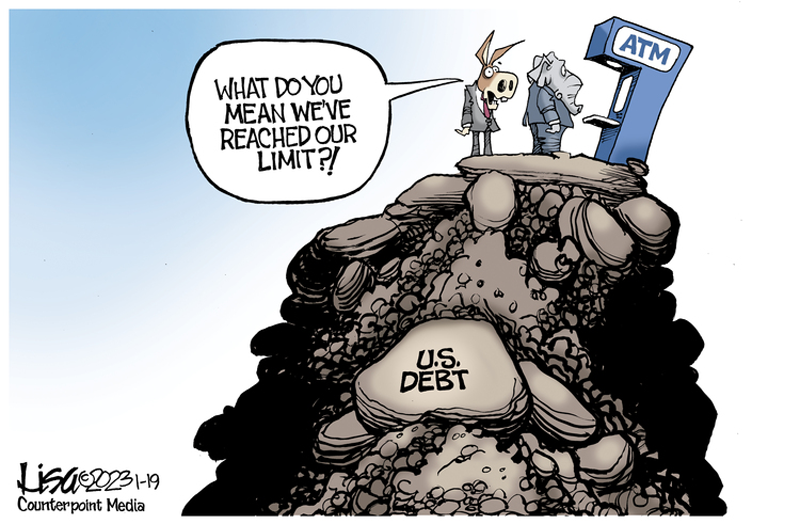
I don’t mind the fact that I often disagree with cartoonists and other political commentators. Not only does it give me something to write about, but I’d be suspicious of a system in which everyone agreed with everyone else, mostly because there’s never been one.
Still, I think it’s possible for everyone to agree, for example, that the Earth is roughly round, and that we cannot have intelligent discussions with people who believe it to be flat.
Point being that it’s hard to have an intelligent conversation when people discuss the debt ceiling without knowing what it is. At least Lisa Benson (Counterpoint) is spreading the blame, however off-topic, among both parties.
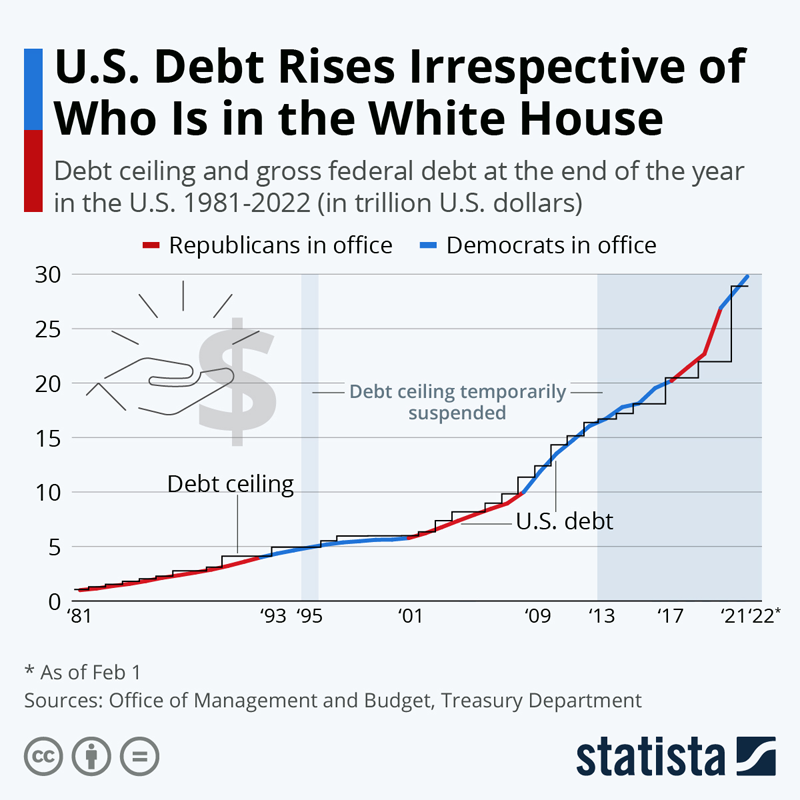
Government debt is a given, as this brief article explains, no matter who is in charge. And the reporter undercuts a partisan talking point in that we had a major boost to the deficit during the Trump Administration by, rather, referring to the pandemic as that period.
We can still argue whether Trump did enough to stem covid, but it’s hard to prove that anyone could have stemmed the debt rise that came along.
However, the Earth is an oblate spheroid and the debt ceiling is not permission to borrow and spend more money but, rather, permission to pay the debts we’ve already incurred, whoever was in charge when it happened.

Ted Rall (Counterpoint) gets it basically right: We’re talking about paying our existing debts. His suggestion that we’re willing to risk our credit rating under GOP leadership is a good summation of the current situation, but it could be debated in a fair conversation.
Still, when your VISA bill arrives, you can argue about future spending and you could even cut up the card, but you still have to pay for the charges that are already on your account, unless you want to tank your credit rating.
There are many differences between your household budget and the national budget, but paying your debts is not one of them. We ran up a tab, and approving the debt ceiling is about paying the bills, not about what we’ll spend in the future.
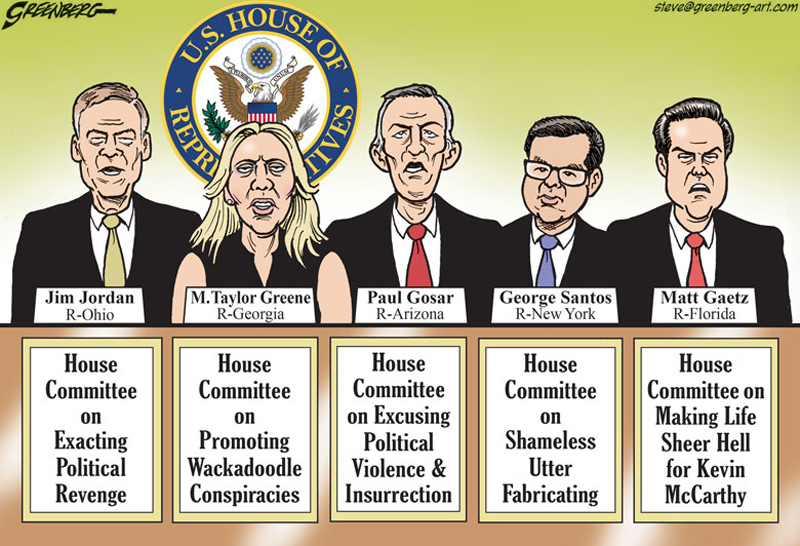
It doesn’t help that, as seen in Steve Greenberg’s cartoon, we’re so deeply invested in partisan rancor that facts and honesty are secondary to power and that some of the most influential voices in the current congress are all but flat-earthers.
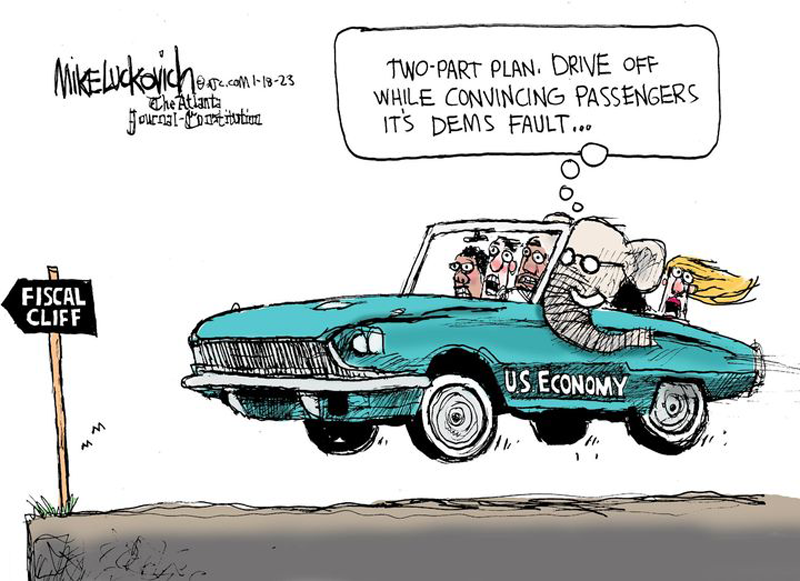
As far as partisanship is concerned, it does seem that Mike Luckovich is correct and that the GOP is willing to destroy our international credit rating and plunge us all into a deep recession for the pleasure of “owning the libs.”
It’s one thing for Ozymandias to have proclaimed himself King of Kings and to boast “Look on my Works, ye Mighty, and despair!”
At least he didn’t stick around, insisting that the vast and trunkless legs of stone, and the shattered visage, were still a tall and mighty monument to his greatness.
We shall see, but this isn’t like watching the Whig Party implode, nor can we expect the disloyal members of government to actually secede and depart this time around, whether it sparks a second civil war or not.
Juxtaposition of the Day
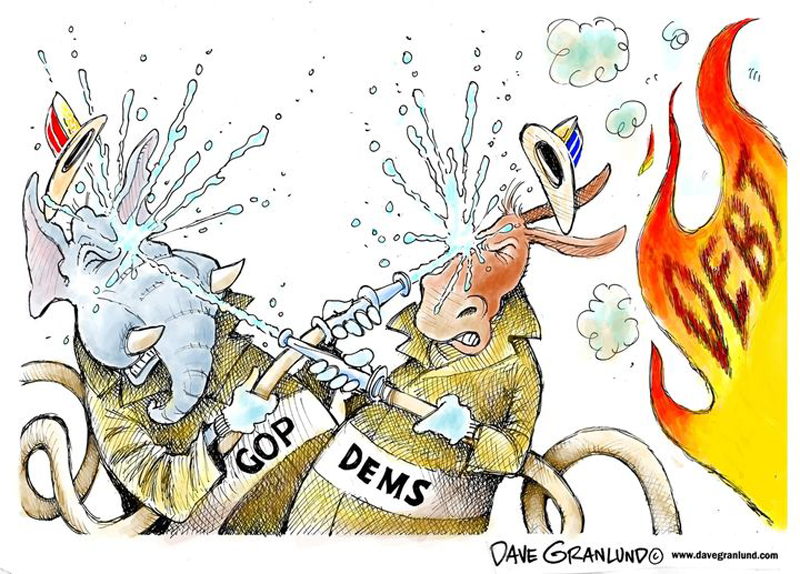

When I become Emperor, I will issue a proclamation that only people who own their homes and their cars outright are permitted to criticize government debt.
Borrowing is baked into the system. Even a balanced budget — in DC or around your kitchen table — includes some level of borrowing.
If, as Granlund suggests, it’s out of control, we should deal with that, but we need some spark to keep things going, so don’t assume you can, or would want to, extinguish the fire entirely.
And if, like Heller, you feel we’re far too dependent on borrowing, be cautious in lumping all the reasons and fixes into one bundle.
To which I will add this: If you are going to insist on comparing the national budget to family budgets, be consistent in the conclusions you draw.
When your personal debts exceed your income, step one is to examine your spending. You had to fix the hot water heater, of course, but did you have to take that cruise?
And if borrowing for a new car is less costly than continuing to patch and repair the old one, maybe that’s an unavoidable expense.
But raising taxes is the macro equivalent of taking a second job: It may not be something you want to do, but it beats no longer taking the kids to the doctor and refusing to spend money to feed them.
I don’t know that it’s fair to insist that cartoonists and other commentators should come up with solutions rather than simply criticize proposals, but I recall one time when someone threw the “What’s your answer?” challenge at Abbie Hoffman and his response was that maybe garbage collectors should be paid more than people with more pleasant jobs.
Not that I expected it to happen, but at least it made sense.
Juxtaposition of FUNEX


The price of eggs, first of all, is irrelevant, because, while it’s gone up 54% in the past 12 months, it’s not because of inflation or anything government related. It’s because an avian flu is making chickens fall over dead in large numbers.
Even Marjorie Taylor Greene would concede that dead chickens lay no eggs.
Okay, maybe she wouldn’t, but they don’t.

However, with all due respect, unless you live in Hawaii, you’re not likely paying eight bucks for a dozen eggs, much less eight bucks for one.

I’ll give Jeremy Nguyen credit both for coming close to the price of eggs in New York, where his cartoon appeared, and for sticking a chicken under Jack’s arm rather than the goose specified in the folk tale, since that’s what we’re talking about. (Left to right: Chicken egg, duck egg, turkey egg, goose egg.)
Jokes are required to be based on twisting actual facts. But you need, first of all, a fact, before you can administer the twist.
Yes, eggs are currently kind of expensive. But, like stepping on Legos in your bare feet, it has nothing to do with the economy.
Though, under the right circumstances, an egg can be hilarious.
Comments 9
Comments are closed.